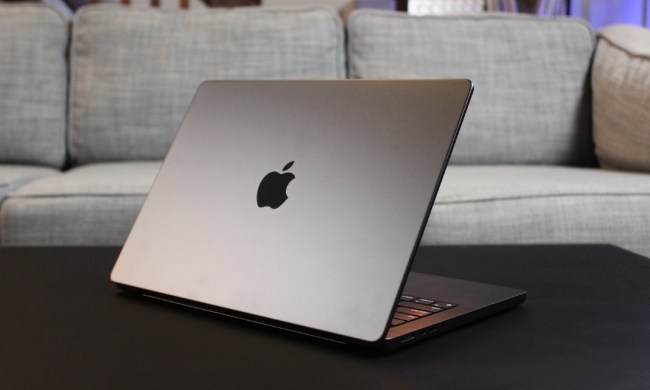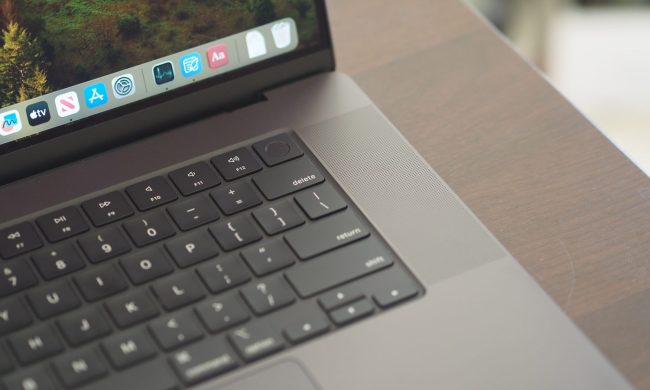
- Nearly perfect screen
- Incredible performance
- Four Thunderbolt 3 ports
- Keyboard and touchpad are excellent
- Surprisingly small
- Disappointing battery life
- Expensive
If you told me you were buying a 17-inch laptop in 2020, I’d call you crazy. There are only a handful of 17-inch laptops available, and with how good 15-inch laptops are, they’re hardly worth your time.
That is, unless you’re talking about the new Dell XPS 17. Unlike most 17-inchers, the XPS 17 is more than just a big screen. It adds performance. Serious performance. The kind even the XPS 15 can’t offer.
I expect a lot out of a laptop that costs nearly $3,000, but with the Nvidia RTX 2060 under the hood and an expansive 17-inch screen, this might be the ultimate content creation workstation.
Design
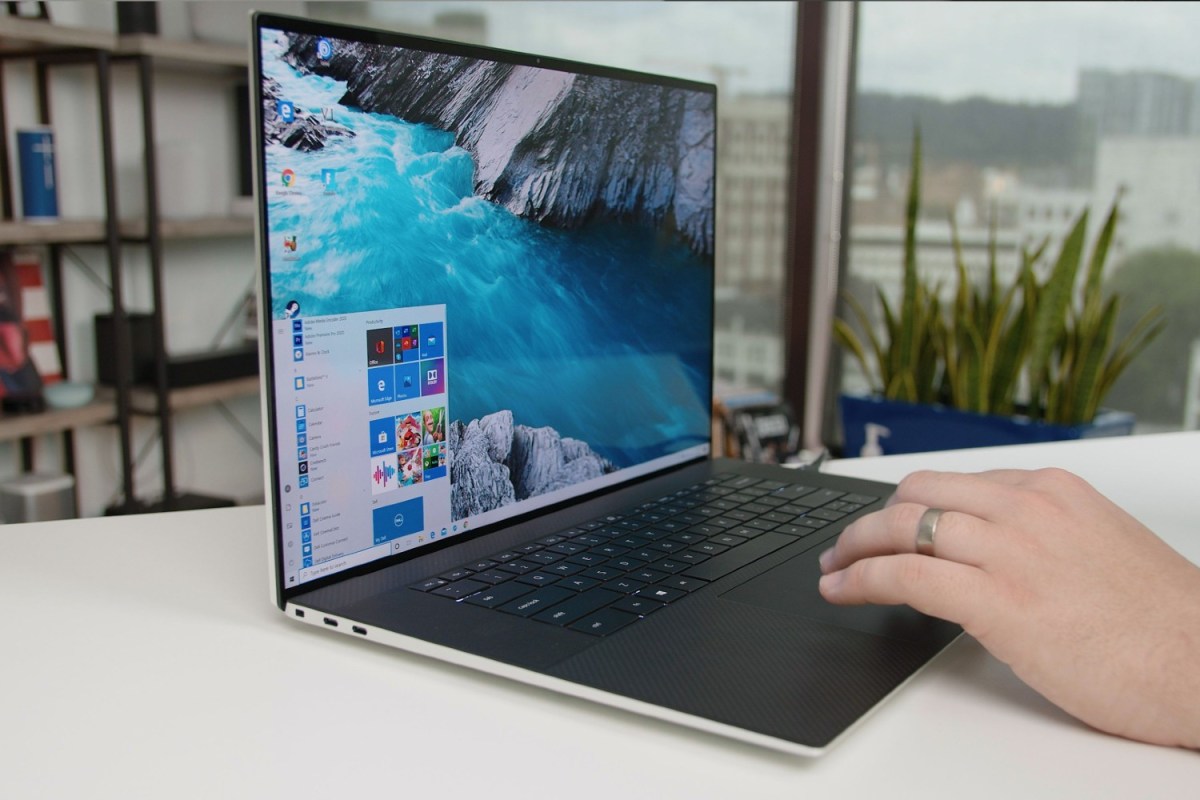
17-inch laptops are massive. It’s one of the reasons they’ve gone out of style. But the engineers and designers at Dell always go through painstaking efforts to ensure its laptops are as small as possible, and those principles apply here, too.
The size of the chassis is only marginally larger than the MacBook Pro 16-inch, both in width and depth. You won’t notice much of a difference sliding it into your backpack, despite having a full inch more of screen. I was surprised to see the XPS 17 fits into the pocket of my backpack, which is only fitted for up to 15-inch laptops. That’s impressive.
As always, the laptop’s display bezels are the key. With thinner borders around each side of the screen (including the bottom chin), the XPS 17 is able to reduce its overall footprint. The display feels all-encompassing. It’s not as noticeable a difference as upgrading from the XPS 13 to the XPS 15, but every inch counts. You’ll appreciate the extra screen whether you’re gaming, editing videos, or even just scrolling a webpage.
If you don’t often use a mouse, you’ll appreciate the spacious and responsive touchpad.
Thickness is the one dimension where the MacBook Pro 16-inch is still smaller. It measures at 0.64 inches and weighs 4.3 pounds. The XPS 17 is a bit bigger at 0.77 inches and weighs 4.65 pounds. That goes up to 5.53 pounds for the touch screen option. It’s not light, though the new Razer Blade Pro 17 is still almost a half-pound heavier.
However, if you’ve already seen the new XPS 15, none of that will surprise you. A lot of the same design elements have been lifted into the larger form factor, including the keyboard, touchpad, 16:10 display aspect ratio, and the carbon fiber weave in the palm rests.
The keyboard and touchpad are highlights. If you’re like me and don’t often use a mouse, you’ll appreciate the spacious and responsive touchpad, in particular. The click is quiet and the tracking is near-perfect. The loose mechanism found in my review unit of the XPS 15 has been resolved in the XPS 17.
Ports and connectivity

To emphasize the “pro” nature of the Dell XPS 17, it has added connectivity. It features four Thunderbolt 3 ports, two on each side. That means you have access to display output, super-fast transfer speeds, charging, and more.
This is two more Thunderbolt 3 ports than the Dell XPS 15, and even one-ups the MacBook Pro 16-inch by including a full-size SD card slot. Photographers and videographers should be delighted.
If you’re coming from an older XPS, MacBook, or even Razer Blade, you may miss legacy ports. If you need HDMI or USB-A connections, you’ll have to rely on dongles or a Thunderbolt 3 hub.
The XPS 17 also has Wi-Fi 6 and Bluetooth 5, the latest in wireless connectivity, which should provide strong network performance and a reliable Bluetooth connection.
Performance
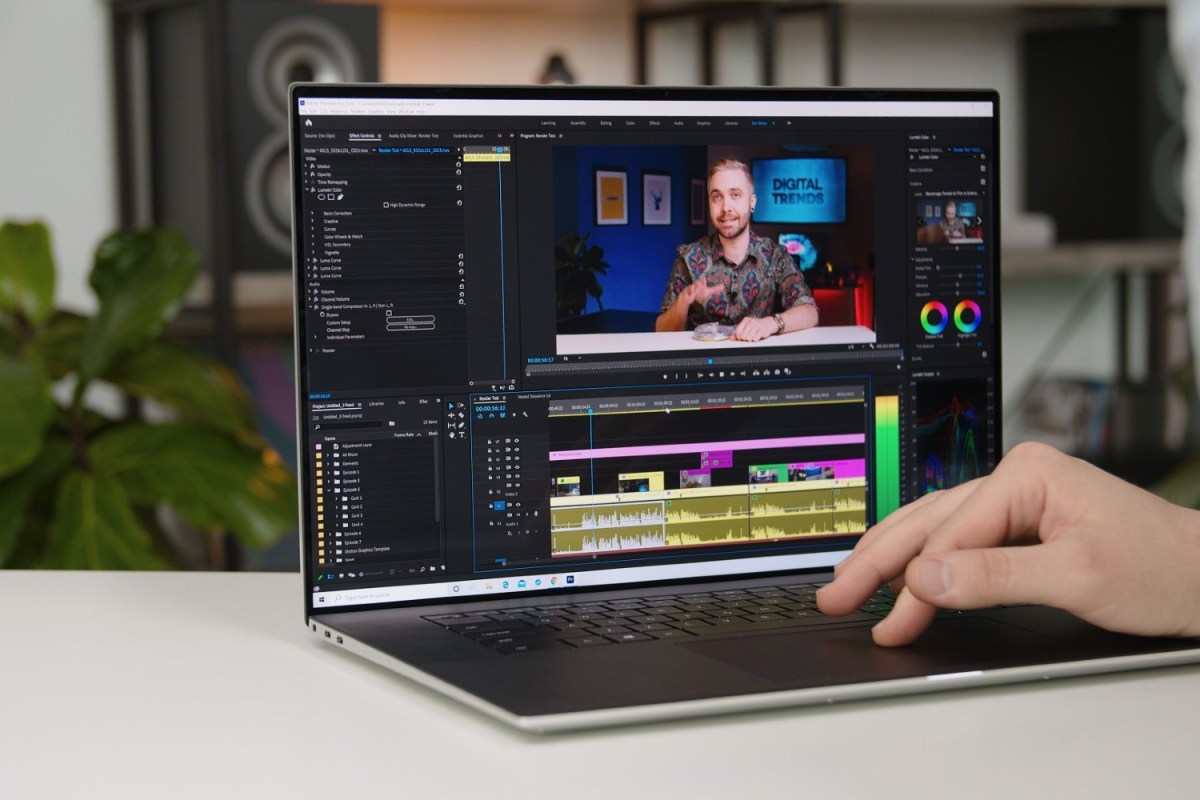
The Dell XPS 15 is already a supremely powerful laptop. When I heard the XPS 17 would take things up a notch, I was curious how that could be achieved. After all, the two laptops have the same processor options. The base model includes the Intel Core i5-10300H and ranges up to the eight-core Intel Core i9-10980HK.
The Core i5 model only has four cores and integrated graphics, so you shouldn’t expect anything special there in terms of performance. It starts at $1,372, more than a base XPS 15, and you’re paying for the larger screen. Laptops like the LG Gram 17 or HP Envy 17 take this approach – and remain relatively niche products.
The processor performance is nothing you can’t find in smaller laptops, like the Dell XPS 15.
The processor used in my review unit, however, was the Intel Core i7-10875H, an eight-core piece of silicon. Paired with 32GB of RAM, the XPS 17 pushed some impressive results in Geekbench 5 and Cinebench R20. It’s 8% faster in multi-core Cinebench R20 than the MacBook Pro 16-inch with it’s Intel Core i9-9980HK. It’s also 9% ahead in Geekbench 5 single-core.
Laptops with the AMD Ryzen 7 3800H or the Intel Core i9-10980HK offer slightly faster processor performance. A Core i9 variant of the Dell XPS 17 is coming, however, to close the gap. In the meantime, this beefed up Core i7 is very powerful, even for content creators, developers, designers, and anyone else that runs heavy applications.
However, the processor performance is nothing you can’t find in the XPS 15. For me, that alone doesn’t justify the larger footprint and higher price tag of the XPS 17. The graphics hardware is another story.
Graphics performance
The Dell XPS 17 features a brand new thermal solution using a combination of vapor chambers and a re-engineered airflow system. Better cooling allows the use of more power-hungry components, like the Nvidia RTX 2060. We’re not talking about a That’s a mighty graphics card for a laptop this thin and light.
The XPS 17 beats the XPS 15’s Nvidia GTX 1650 Ti by 35% in 3DMark Time Spy. Meanwhile, it’s even neck-and-neck with the Asus ROG Zephyrus G14, a gaming laptop that uses the same RTX 2060 GPU. Unlike the XPS 15, which has always had limited gaming performance, the XPS 17 is a full-blown gaming laptop. It plays Assassin’s Creed Odyssey at 41 FPS (frames per second) at 1080p and Ultra detail, and that’s a supremely challenging game to play. That’s 37% better than the XPS 15, and it’s only a few frames behind the ROG Zephyrus G14.

Of course, performance held up in lighter games like Fortnite, which was playable at near 60 FPS, even up to 1440p at Epic graphics settings. If you want to plug into an external high refresh rate monitor, you can even enjoy frame rates as high as 116 at 1080p resolution with High detail settings. Of course, it’s not a good experience at 4K, but that’s not surprising.
The XPS 17 held similar frame rates in Battlefield V. 4K is off limits, but 1440p gameplay was smooth and looks crisp.
The lack of a higher refresh rate or G-Sync support is the only feature missing from the gaming experience. Limiting the frame rate and enabling V-Sync is probably the best way to go in most games to avoid screen tearing, but it doesn’t quite replicate the experience of a high-end gaming laptop. As much as I wish all new laptops had 120Hz or 144Hz screens, we’re not there yet.
But again, the XPS 17 isn’t branded as a gaming laptop, and those pumped-up graphics have plenty of other uses. It’ll blow through 3D modeling and AutoCAD, and it’s an extremely powerful option for video editing.
The Apple MacBook Pro 16-inch’s performance doesn’t hold a candle to the Dell XPS 17.
I tried out some video rendering in Adobe Premiere, which can make full use of the graphics card on some laptops. The XPS 17 was one of the fastest laptops in our test, which exports a two-minute 4K video clip at ProRes 422. The task completed in just five minutes and 47 seconds, beating the XPS 15 by three minutes. You might get more out of a chunky workstation with an Intel Xeon processor, but the two are hardly worth comparing.
The Apple MacBook Pro 16-inch doesn’t hold a candle to the XPS 17, even with its recent graphics card upgrade. The only device to barely beat it in this test was the Microsoft Surface Book 3 15. That 2-in-1 houses the graphics card in a separate chassis. It’s not a fair fight, though it does show just how powerful graphics cards can be if the software is optimized for it.
The new Razer Blade Pro 17 may surpass it as a video editing option when it launches later this year. It offers the same eight-core processor alongside the far more powerful Nvidia RTX 2080 Super Max-Q graphics card. I won’t know how it performs for sure until I test it myself, but the specs look promising.
The base model of the XPS 17, of course, uses integrated Intel graphics, meaning you can’t expect it to be much of a gaming machine. There’s also an option for an Nvidia GTX 1650 Ti graphics card if you’d like a little extra performance at a lower cost. The GTX 1650 Ti option could serve you well if you’re willing to play games at medium detail settings.
Display and speakers

Like the Dell XPS 15, the XPS 17 offers two choices for displays. One is 1,920 x 1,200, which comes in the base model. It’s more pixels than a standard 1080p screen, but most people will want to opt for the 3,840 x 2,400 display. It’s nearly perfect. It’s the most color-precise screen I’ve ever tested, and its color gamut is up to 96% in the Adobe RGB color space. Not even the MacBook Pro 16-inch can compare, despite being known as a leader for image quality.
The XPS 17’s 4K display will never have a brightness and contrast ratio quite as high an OLED screen, but the XPS 17 is no slouch there, either. The contrast ratio is 1530:1, making it a beautiful screen for gaming and movie-watching, bringing out a broad spectrum of color depth. At a max of 491 nits, I never had a problem with screen glare, even while working outside.
The speaker grille is larger, but the sound itself isn’t.
I had high hopes for the rest of the multimedia experience on the XPS 17. Like the XPS 15, the speakers are hidden under a series of laser-cut holes on the keyboard deck. Here, the speaker grille is larger, but the sound itself isn’t.
The XPS 17’s audio sounds nearly identical to that on the XPS 15, which offers a bit of bass and decently rounded sound profile. It’s better than many laptops, even expensive options like the Razer Blade Pro 17. But do they compete with the MacBook Pro 16-inch, or even the MacBook Air? Unfortunately not. The bass and richness of audio quality just isn’t there.
Battery life
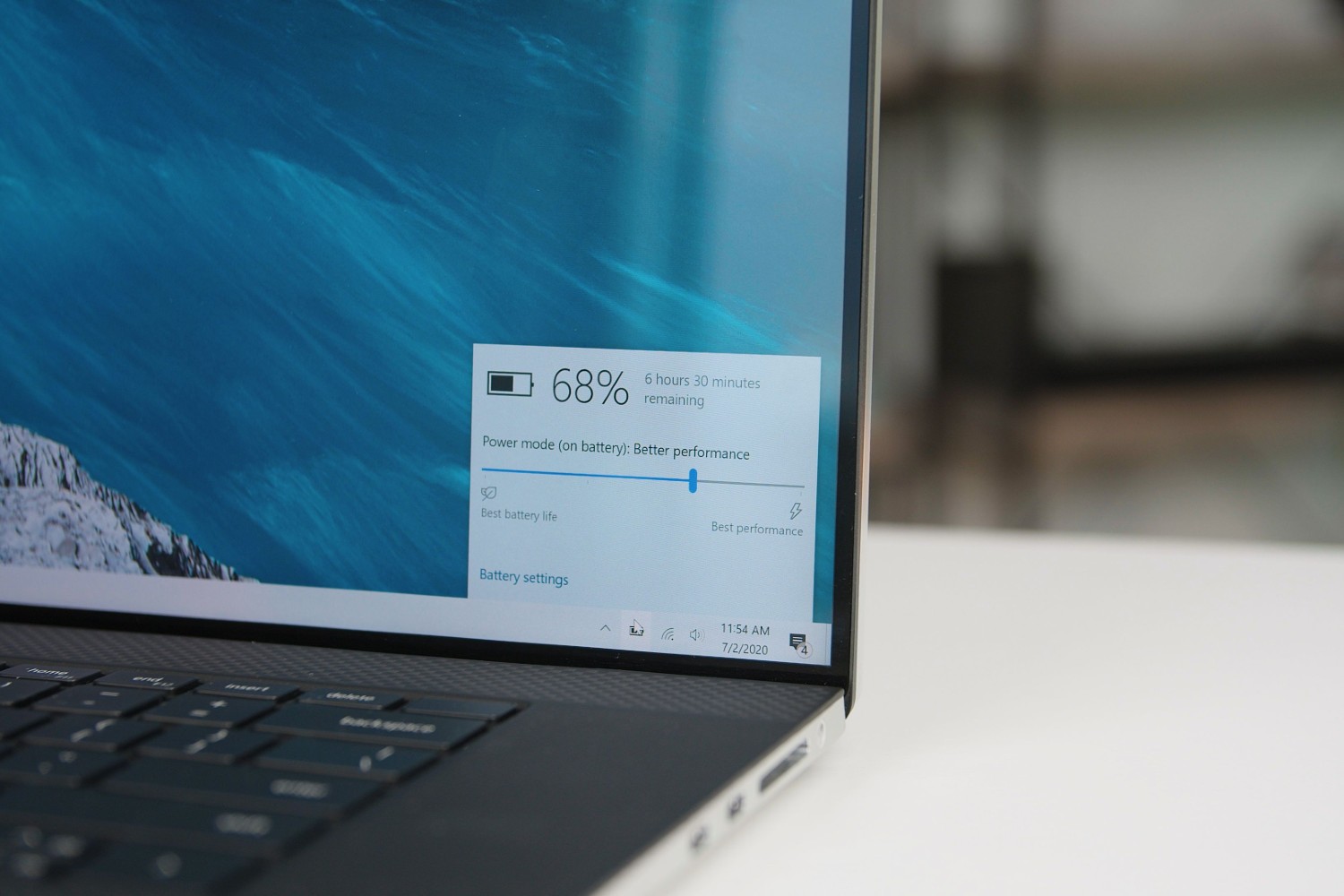
I didn’t expect the Dell XPS 17 to provide good battery life. Most laptops with 4K screens don’t last long on a single charge, and adding an extra two inches of screen doesn’t help. I didn’t anticipate it being quite this bad, though.
Despite having a massive 97 watt-hour battery, the XPS 17 only lasted around four and a half hours for my normal day of usage. My workflow isn’t overly heavy, consisting primarily of web applications, dozens of tabs, and some video or audio streaming.
If your workload is simple, endurance improves quite a bit. For example, in our video playback test which loops a local 1080p video until the battery dies, the XPS 17 lasted almost seven hours. But it daily usage, the MacBook Pro 16-inch is still going to outlast it.
I also tested it on the Basemark 3.0 web benchmark, which simulates battery life while taxing the CPU heavily. The XPS 17 only lasted three hours. That’s a poor score for a modern mainstream laptop, and more in line with dedicated gaming laptops.
Of course, if you opt for the lower resolution screen, you should see at least a couple hours of extra battery.
Our take
If the Dell XPS 17 had been nothing more than the XPS 15 with a bigger screen, I wouldn’t be impressed. But if you’re looking for absolute performance, there’s a new king in town — and it’s not nearly as large as you might assume.
It’s not cheap, and the battery life is disappointing. But if you want a sleek, professional laptop that can churn through heavy workloads, the Dell XPS 17 is the complete package.
Are there are any alternatives?
The MacBook Pro 16-inch is this laptop’s main competitor. It’s more expensive, though, and doesn’t offer as powerful of graphics performance.
The Razer Blade Pro 17 poses a strong threat to the XPS 17. The updated model now offers the same eight-core Intel processor, but it can be configured up to an Nvidia RTX 2080 Super Max-Q graphics card. It also has a much faster 300Hz refresh rate screen for smoother gaming. The Razer Blade Pro 17 is larger and heavier, and can only be configured with a 4K screen starting at a whopping $3,800.
Lastly, Dell’s own XPS 15 should be considered as an alternative. It’s a bit cheaper, smaller, gets better battery life, and is still quite powerful.
How long will it last?
The Dell XPS 17 should last you at least five years. It’s a well-built and powerful laptop. You can even upgrade the memory or storage down the line if you need to. It comes with a one-year warranty, though Dell offers extended accidental damage service or premium hardware support up to four years.
Should you buy it?
Yes. The Dell XPS 17 is a supremely powerful laptop, uniquely fit for content creators.

